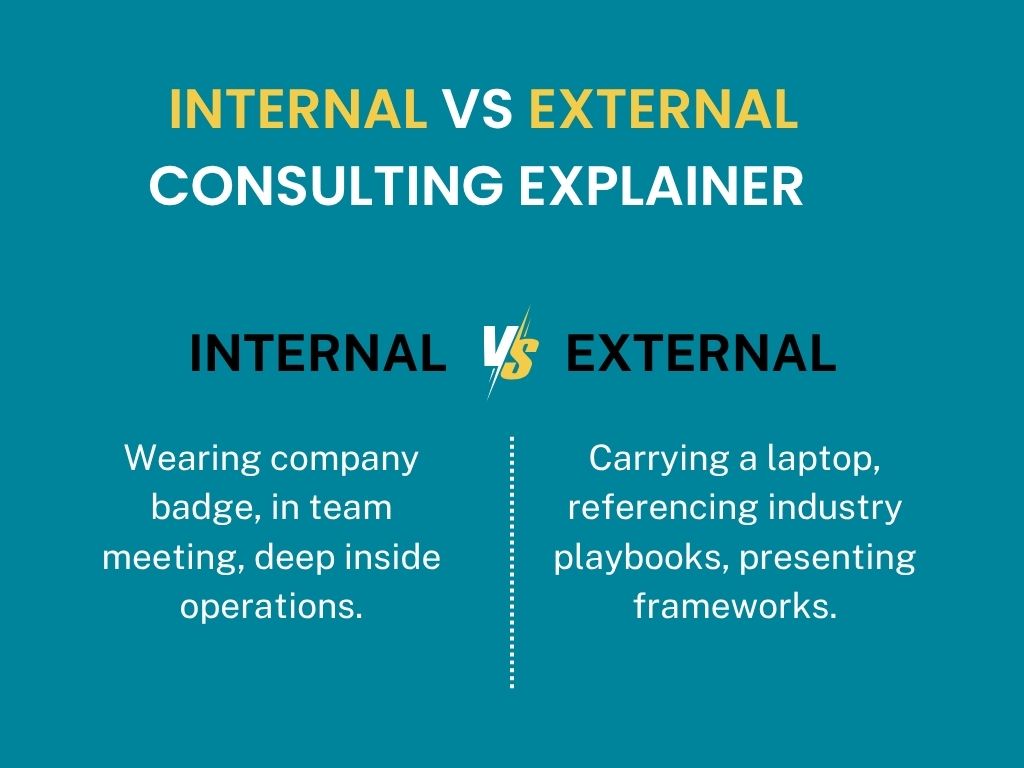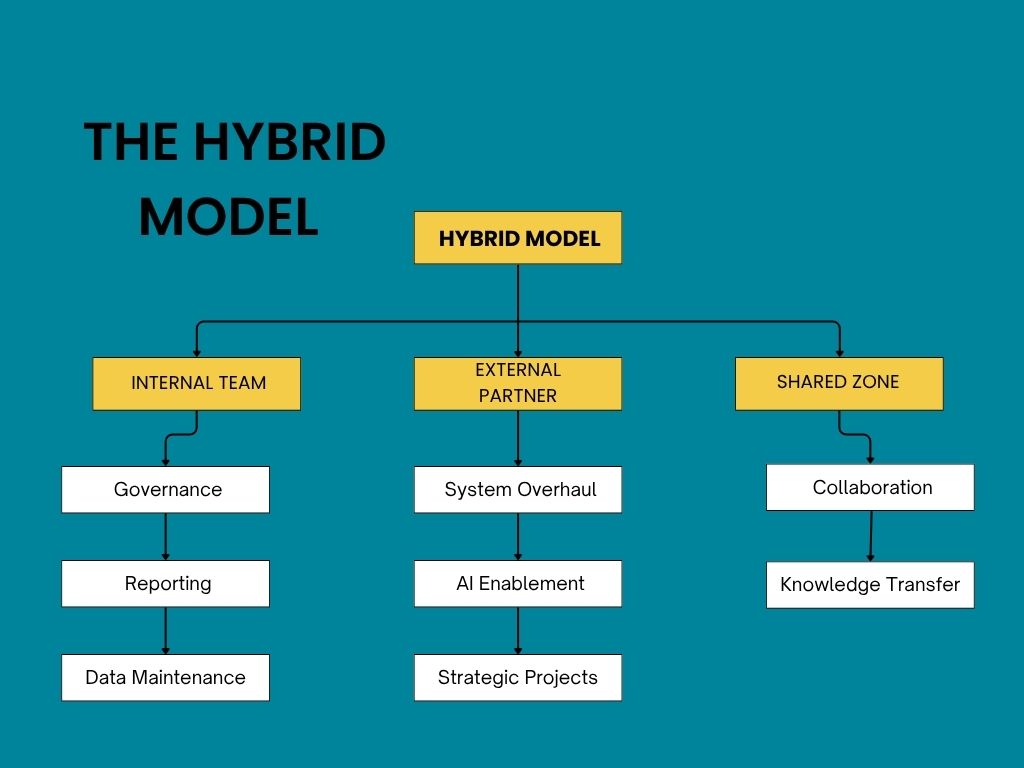As companies become increasingly data-driven, the need for effective Data Strategy Consulting has become a top priority. One major decision organizations face is whether to build an in-house data strategy team or to rely on external consultants. While both approaches have their advantages, the best choice depends on your business needs, resources, and long-term goals. This article explores the pros and cons of each option and provides a framework to guide your decision.
What Is Data Strategy Consulting?
Data Strategy Consulting involves creating a tailored roadmap to help businesses manage, govern, analyze, and use data to meet their goals. These services often include defining a Data Strategy Plan, building a Data Strategy Framework, improving architecture, and ensuring compliance and security. Whether handled via internal consulting or through external consultation, the goal is to turn data into a strategic asset.
Consultants assess an organization’s data maturity, identify bottlenecks in current workflows, and recommend scalable solutions that align with overall business objectives. This can range from creating a centralized data warehouse to building automated reporting pipelines that support real-time decision-making.
In-House Data Strategy: Pros and Cons
Investing in an in-house data strategy team offers a high degree of control, continuity, and cultural alignment. However, it also comes with substantial operational costs and scalability limitations. Let’s explore both sides.
Pros:
- Deep Business Understanding
An internal consultant is embedded within your organization and understands the nuances of internal workflows, systems, and business goals. This familiarity helps tailor data strategies to your unique environment—ensuring greater alignment between data initiatives and real-world needs.
- Real-Time Collaboration and Integration
With an on site consultant or in-house team, communication is immediate. Teams can quickly clarify goals, adapt plans, and work cross-functionally without delays. This direct access builds trust and supports faster execution of data-driven decisions.
- Data Ownership and Long-Term Continuity
Keeping data strategy in-house means you retain complete control over sensitive information, data governance protocols, and intellectual property. Over time, your team builds valuable institutional knowledge—understanding legacy systems, internal politics, and business history that an outsider might miss.
Cons:
- High Talent and Infrastructure Costs
Building an in-house team requires significant investment—not just in hiring top talent, but also in retaining them. Add in infrastructure, training, and technology stacks, and the costs can escalate quickly. For smaller companies, this often becomes a barrier to scalability.
- Slower to Adapt and Scale
Internal teams ay be well-suited for steady operations, but rapid changes—like migrating systems, adopting AI tools, or responding to new compliance laws—can stretch them thin. Scaling quickly may require resources or expertise they don’t yet have.
- Limited Exposure to Industry Innovation
Without regular external input, in-house teams can become isolated from emerging technologies and best practices in Data Management Consulting or evolving Data Strategy Frameworks. This can result in slower innovation or inefficiencies compared to peers using outside experts.
Outsourcing Data Strategy: Pros and Cons
Outsourcing your data strategy can accelerate implementation, reduce costs, and give you access to highly specialized skills. However, it also requires careful onboarding, clear communication, and proactive management to avoid disconnects.
Pros:
- Specialized Expertise on Demand
Hiring data strategy consultants gives you instant access to seasoned professionals with deep experience in Data Management Consulting, architecture design, predictive analytics, and compliance frameworks. These experts bring cross-industry insights and tested methodologies—often helping you avoid mistakes you don’t even know to look for.
- Faster Execution with Proven Frameworks
External teams often come equipped with pre-built tools, accelerators, and Data Strategy Frameworks that allow them to hit the ground running. Because they’ve implemented similar solutions elsewhere, they can deploy and iterate quickly—often cutting months off internal timelines.
- Cost Efficiency and Scalability
One of the biggest benefits of data consulting is flexibility. Instead of building a permanent team, you pay for only what you need—whether it’s a 6-week project or a 6-month transformation. This shifts costs from fixed overhead to a more manageable, project-based model.
Cons:
- Onboarding and Ramp-Up Time
Even top-tier external consultants need time to learn your systems, internal workflows, and stakeholder landscape. In the early stages, expect a learning curve as they get aligned with your team’s culture and strategic direction.
- Risk of Over-Dependency
If too much institutional knowledge remains with external providers, your internal teams may struggle to carry the strategy forward independently. This dependency can create long-term capability gaps and make future iterations harder to manage without continued outside help.
- Limited Contextual Awareness
Without day-to-day immersion in your business, external teams may miss subtle context—like internal politics, legacy issues, or evolving business priorities. If there isn’t a strong internal sponsor to bridge that gap, the risk of misalignment increases.
What’s the Difference Between Internal and External Consulting?
When considering how to execute your data strategy, understanding the core distinctions between internal consulting and external consultation is crucial. While both roles aim to drive improvement and strategic alignment, their position within the organization—and their access to information, trust, and influence—can differ significantly.
Internal Consulting
Internal consultants are full-time employees within your organization. Because they’re embedded in the business, they bring deep institutional knowledge, understand company culture, and typically have strong, established relationships with key stakeholders. They’re well-positioned to champion long-term initiatives and often act as the bridge between strategy and execution.
- Strengths: Trust, continuity, deep understanding of internal processes
- Ideal for: Ongoing initiatives, operational optimization, and cultural alignment
External Consulting
External consultants—often brought in as direct business consultants or part of a data strategy services firm—offer fresh perspectives and broad cross-industry expertise. Their value lies in objectivity, rapid delivery, and access to proven frameworks and technologies. However, they may require additional time to onboard and align with company-specific dynamics.
- Strengths: Innovation, scale, specialized expertise
- Ideal for: Transformation projects, tech implementations, audits, and strategic resets
What About On-Site Consultants?
A consultant on site can be either internal or external. What matters most isn’t their badge—it’s how well they’re integrated with your teams. On-site consultants are most effective when they have consistent access to stakeholders, participate in key decision-making, and are included in day-to-day strategy execution.
When to Choose In-House Vs Outsourcing
| Consideration | In-House Data Strategy | Outsourcing Data Strategy |
| Budget | High fixed costs | Flexible, variable costs |
| Expertise | Domain-specific but limited | Broad, cross-industry knowledge |
| Speed | Slower ramp-up, sustained impact | Fast deployment, short-term execution |
| Data Security | Greater control over systems | Relies on contractual safeguards |
| Strategic Fit | Deeply embedded in culture | Better for fresh, unbiased perspectives |
| Innovation | Incremental improvement | Rapid exposure to new tech and methods |
Hybrid Models: The Best of Both Worlds
Increasingly, organizations are pursuing hybrid strategies that combine internal consulting with external consultation. Internal teams manage core operations and governance, while external experts are brought in for innovation, change management, or system redesigns.
For example, a retail company might rely on its in-house data strategy team for ongoing reporting, but bring in a data strategy consultant to overhaul its customer analytics framework or implement AI-powered personalization.
Benefits of Data Consulting
Whether through internal teams or external partners, Data Strategy Consulting provides critical advantages:
- Strategic Clarity: A robust Data Strategy Plan ensures business objectives are tightly aligned with data initiatives.
- Informed Decision-Making: Access to the right data at the right time reduces guesswork and boosts agility.
- Operational Efficiency: Automation and process optimization reduce manual work and improve data flow.
- Risk Reduction: Stronger data governance and compliance practices minimize regulatory and security risks.
- Future-Proofing: Consultants introduce scalable frameworks and ensure adaptability to future tech and market shifts.
Final Thoughts
There’s no one-size-fits-all answer in the debate of In-House vs. Outsourced Data Management. Your decision should reflect your budget, timeline, culture, and goals. In many cases, a phased or hybrid approach provides the balance organizations need.
Start by evaluating your internal strengths and identifying where external help can accelerate results. Whether you choose to grow an internal team or hire data strategy services, the ultimate goal is the same: creating a data-driven organization built on insight, efficiency, and adaptability.
Book a free strategy session with Symufolk.
Perguntas frequentes
1. What is the role of a data strategy consultant?
They help organizations define, implement, and optimize a data roadmap aligned with business goals, often combining technology with business process redesign.
2. Is it better to keep data strategy in-house or outsource it?
There’s no universal answer. Outsourcing offers agility and breadth, while internal teams offer alignment and control. Many organizations combine both.
3. What services are included in data strategy consulting?
Common services include data maturity assessments, governance design, architecture development, analytics implementation, and change management support.
4. How does outsourcing reduce cost?
Outsourcing avoids fixed long-term costs associated with full-time employees, offering cost-efficient project-based solutions with faster delivery.
5. Can external consultants work on site?
Yes. Many firms provide a consultant on site or hybrid support models that combine onsite and remote work for integrated execution.








